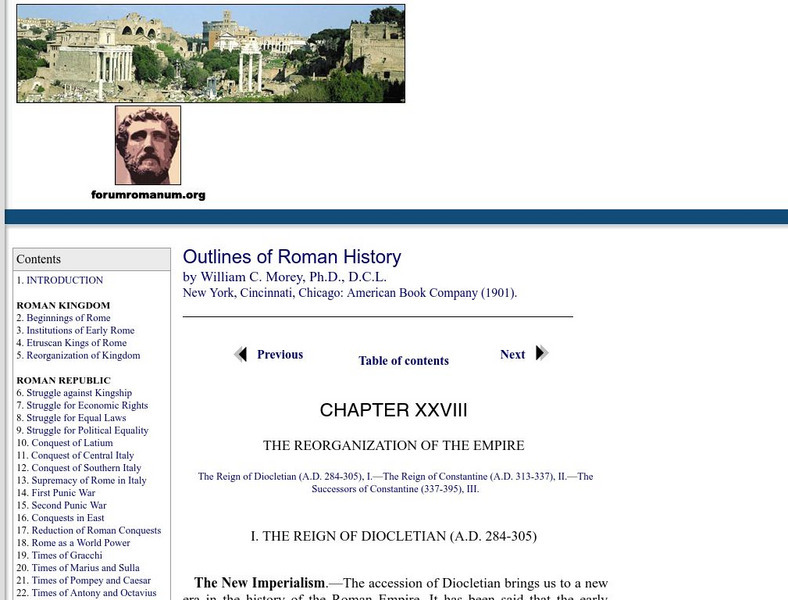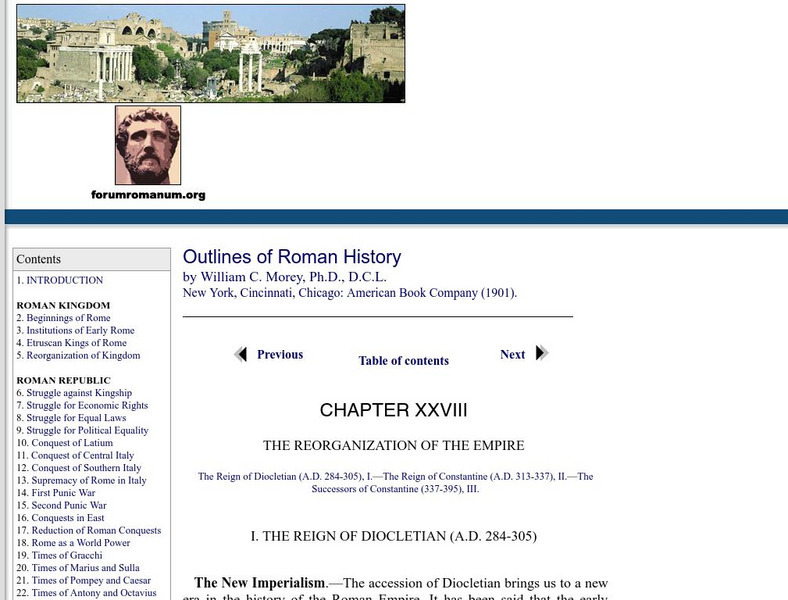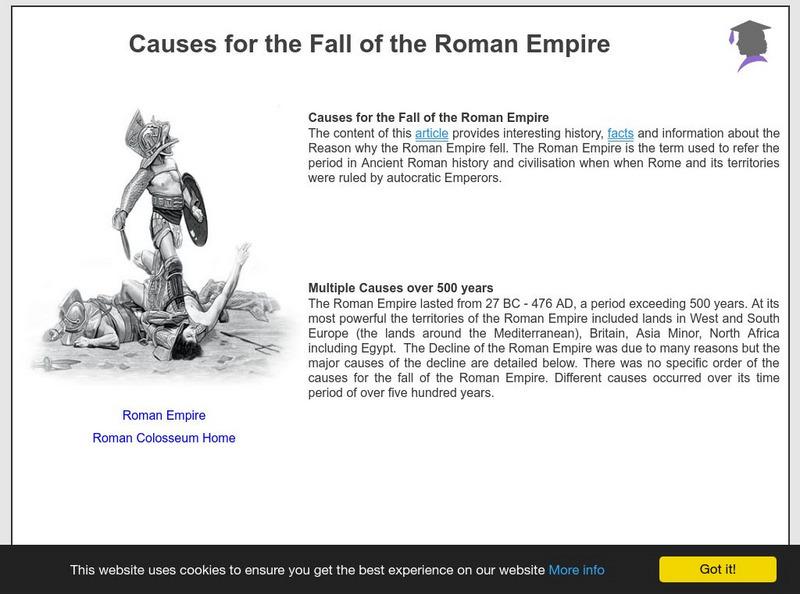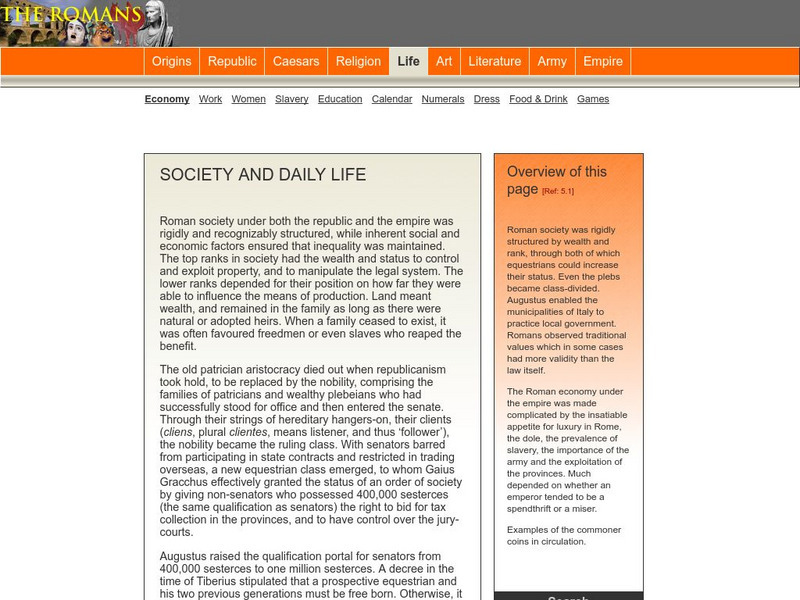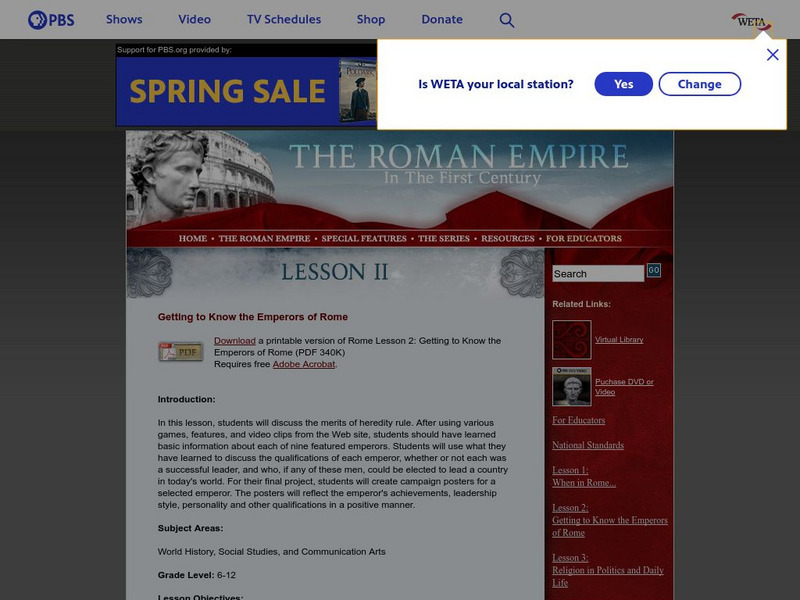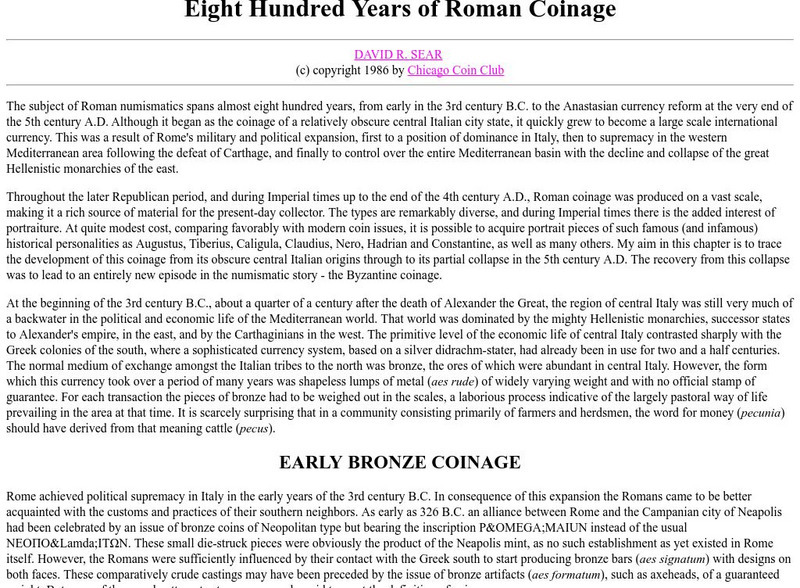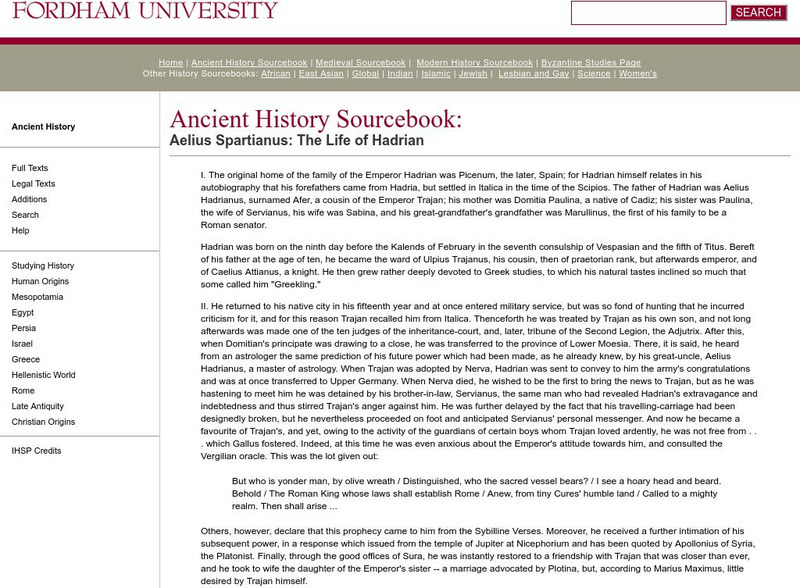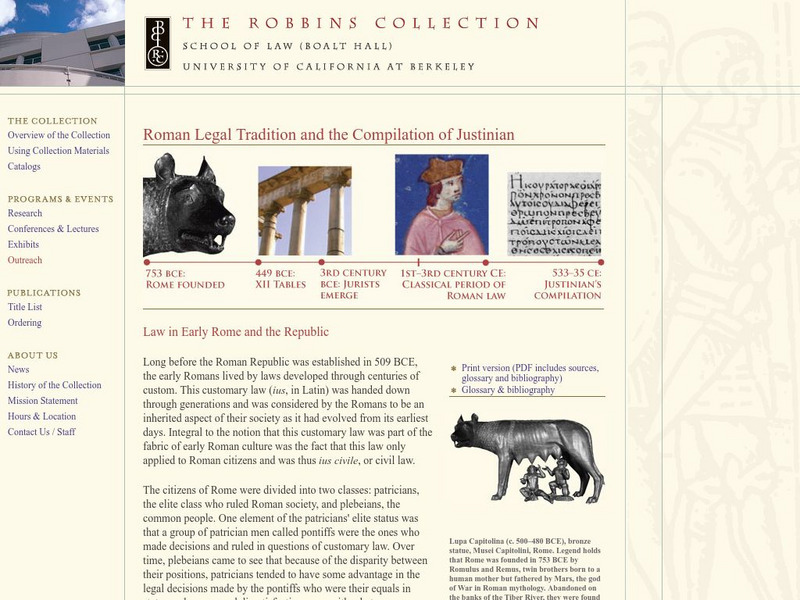Internet History Sourcebooks Project
Fordham University: Ancient History Sourcebook: Divine Augustus
This is a translation of an extensive Roman work on Augustus and his reign. His family, family history, childhood, the loss of his father, his military career, and more are discussed in this extensive study of his life.
Forum Romanum
Outlines of Roman History: Reorganization of Empire: The Reign of Constantine
In this entry from William Morey's 1901 textbook you will read about Constantine and the changes he made that had a lasting effect on the Roman Empire.
Forum Romanum
Outlines of Roman History: Reorganization of Empire: Successors of Constantine
William Morey, in his 1901 textbook, tells of the fate of the Roman Empire after the death of Constantine.
Forum Romanum
Outlines of Roman History: Fall of the Western Empire
This last entry in William Morey's 1901 textbook tells about the final demise of the Roman Empire in the West, the fall of the Roman Empire.
Forum Romanum
Outlines of Roman History: Reorganization of Empire: The Reign of Diocletian
The reign of Diocletian is discussed in this article from William Morey's 1901 textbook. Check out the chart that shows how the Roman Empire was split into East and West.
Other
Heraldica: The Holy Roman Empire: Structure and Composition
Series of hyperlinked essays discuss facets of the Holy Roman Empire: its beginnings, structure, impact, and end.
Internet History Sourcebooks Project
Fordham University: Medieval Sourcebook: Edicts of Toleration
This site contains information on two important religious edicts given by Roman emperors relating to Christianity and its role as a persecuted religion in ancient Rome.
Friesian School
Friesian: Kings and Emperors
This resource provides a list of the known chieftains and a description of their involvement in the damage of Roman power.
PBS
Pbs: The Roman Empire of the 1st Century: The Roman Empire: Who Are You?
Take this quiz to learn which Roman emperor you are most like.
Khan Academy
Khan Academy: Damnatio Memoriae Roman Sanctions Against Memory
Damnatio memoriae is a term we use to describe a Roman phenomenon in which the government condemned the memory of a person who was seen as a tyrant, traitor, or another sort of enemy to the state. The images of such condemned figures...
Other
Siteseen Ltd: Causes for the Fall of the Roman Empire
This article addresses the many reasons why the world's greatest superpower of the 4th century, the Roman Empire, crumbled and fell. Many reasons are discussed in detail, including the spread of Christianity, the invasion of various...
Other
The Romans: Society and Daily Life
Roman society was rigidly structured by wealth and rank, through both of which equestrians could increase their status. Even the plebs became class-divided. Augustus enabled the municipalities of Italy to practice local government....
The History Cat
The History Cat: The Roman Empire
The Roman Republic was ruled by emperors for over 400 years. Learn interesting details about the most famous one, Caesar Augustus.
Ducksters
Ducksters: History of Ancient Rome for Kids: The Roman Emperors
Kids learn about the emperors of Ancient Rome on this site. After the fall of the Roman Republic, these powerful leaders ruled much of the known world.
Loyola University Chicago
De Imperatoribus Romanis: Nero
Biography of Nero contains good, balanced information about this often misunderstood emperor.
PBS
Pbs: The Roman Empire of the 1st Century: Getting to Know the Emperors of Rome
In this lesson, students will discuss the merits of heredity rule. After using various games, features, and video clips from the Web site, students should have learned basic information about each of nine featured emperors. Students will...
Other
Chicago Coin Club: Eight Hundred Years of Roman Coinage
Nearly halfway through this page under the subtitle, "Disintegration of the Monetary System" is a discussion of the monetary collapse and the efforts of subsequent emperors to restore the coinage.
BBC
Bbc: The Colosseum: Emblem of Rome
The Colosseum is a symbol of Roman strength and cruelty. It is a testimony to the achievements the Romans made to architecture and engineering. Examine the colosseum from its construction to its use in the cruel games Romans used to...
Internet History Sourcebooks Project
Fordham University: Ancient History Sourcebook: Aelius Spartianus
Fordham University provdides this very detailed study of the life and leadership of Hadrian. It looks at his background, his reign, and his death.
Other
Georgetown College: Roman Emperors: The Severi (Ad 193 235)
Page down to The Severi for a list of the Severan Rulers from 193-235 A.D., a very brief summary of their beginnings, and the years they came to power.
Internet History Sourcebooks Project
Fordham University: Medieval Sourcebook: Grant of a Market at Bremen
Fordham's Medieval Sourcebook contains the text of a decree providing minting rights and protection, issued by Holy Roman Emperor Otto I to the merchants of Bremen, 965 A.D..
Other
University of Illinois: The Early Centuries of the Greek Roman East
Read about the history of the Romiosini, or Greek Middle Ages and the development of the Greek-Roman east. The article is divided into two different sections. The first section includes the foundation of Constantinople as a means to...
University of California
University of California: Roman Legal Tradition and the Compilation of Justinian
Discover all you can about the history of the Roman legal system. Sections include law in early Rome, the Twelve Tables, the evolution of the Roman legal system and Classical Roman law, and then read an entire section regarding the...
Friesian School
Fresian School: Rome and Romania
This article, which is provided for by the Fresian School, covers a large part of Roman history, but pays particular attention to the reign and effects of Emperor Nero.




